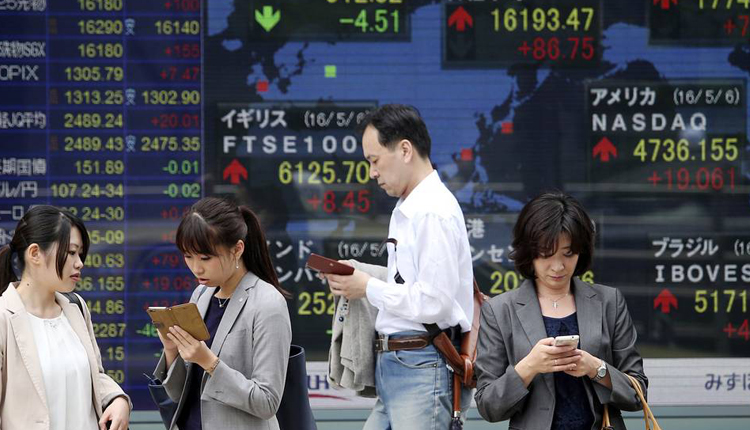Stocks in China saw strong gains on the first trading day of February as hopes rise for a U.S.-China trade deal. However, the country’s manufacturing data came in below expectations.
Mainland Chinese markets saw gains on the day, as the Shanghai composite rose 1.3 percent to close at around 2,618.23 while the Shenzhen component jumped 2.738 percent to finish its trading day at about 7,684.00. The Shenzhen composite also climbed higher by 2.765 percent to close at approximately 1,309.99.
Hong Kong’s Hang Seng index slipped 0.23 percent, in the final hour of trade.
A private survey on China’s manufacturing sector on Friday showed that factory activity contracted in January. The Caixin/Markit Manufacturing Purchasing Managers’ Index (PMI) came in at 48.3 in January, compared to 49.7 in December. Analysts polled by Reuters had expected the Caixin PMI to be 49.5 last month.
“The terrible decline in the Caixin PMI index from 49.7 in December to only 48.3 in January shows just how important it is for China and the US to secure a trade deal. If nothing else, a deal should prevent the near-term imposition of higher tariffs,” Robert Carnell, ING’s chief economist and head of research for Asia Pacific, said in a note.
Elsewhere in Asia, the mood appeared more cautious.
Stocks in China saw strong gains on the first trading day of February as hopes rise for a U.S.-China trade deal. However, the country’s manufacturing data came in below expectations.
Mainland Chinese markets saw gains on the day, as the Shanghai composite rose 1.3 percent to close at around 2,618.23 while the Shenzhen component jumped 2.738 percent to finish its trading day at about 7,684.00. The Shenzhen composite also climbed higher by 2.765 percent to close at approximately 1,309.99.
Hong Kong’s Hang Seng index slipped 0.23 percent, in the final hour of trade.
A private survey on China’s manufacturing sector on Friday showed that factory activity contracted in January. The Caixin/Markit Manufacturing Purchasing Managers’ Index (PMI) came in at 48.3 in January, compared to 49.7 in December. Analysts polled by Reuters had expected the Caixin PMI to be 49.5 last month.
“The terrible decline in the Caixin PMI index from 49.7 in December to only 48.3 in January shows just how important it is for China and the US to secure a trade deal. If nothing else, a deal should prevent the near-term imposition of higher tariffs,” Robert Carnell, ING’s chief economist and head of research for Asia Pacific, said in a note.
Elsewhere in Asia, the mood appeared more cautious.
Japan’s Nikkei 225 closed slightly higher at 20,788.39 while the Topix index shed 0.18 percent to finish its trading day at 1,564.63, as shares of Fast Retailing advanced 1.97 percent. Nintendo, however, plunged 9.19 percent after the company cut its sales forecast for the Switch game console in the fiscal year ending March 2019.
South Korea’s Kospi closed slightly lower at 2,203.46.
In Australia, the ASX 200 ended its trading day largely flat at 5,862.8. The materials subindex advanced 0.34 percent as shares of major miners rose. Rio Tinto was up 0.6 percent, Fortescue Metals Group jumped 3.36 percent and BHP Billiton gained 0.49 percent.
US-China trade hopes
U.S. President Donald Trump told reporters in the Oval Office on Thursday that he hoped to strike a deal with China before the March deadline. Trump also said Chinese President Xi Jinping told him in a letter that he hopes both sides will be able to meet each other halfway on a trade agreement before the deadline.
The comments came on the same day that the U.S. and China concluded two days of high-level negotiations in Washington.
Two sources also told CNBC on Thursday that U.S. and Chinese officials are talking about arranging a meeting between Trump and Xi for late February.
Meanwhile, stocks stateside closed out their best January in three decades amid strong earnings. The S&P 500 jumped 7.87 percent, its best January performance since 1987, while the Dow Jones Industrial Average soared 7.17 percent in the month — its biggest January gain in 30 years.
Currencies and oil
The U.S. dollar index, which tracks the greenback against a basket of its peers, was at 95.591 after seeing lows above 95.1 yesterday.
The Japanese yen traded at 108.93 against the dollar after seeing highs around 108.5 yesterday. The Australian dollar changed hands at $0.7242 after touching an earlier high of $0.7278.
Oil prices saw some gains in the afternoon of Asian trade. The international benchmark Brent crude futures contract rose 0.18 percent to $60.95 per barrel while U.S. crude futures was largely flat at $53.81 per barrel.


